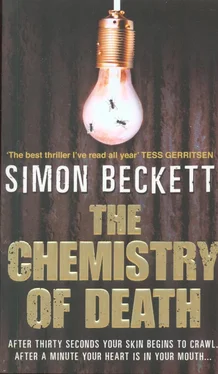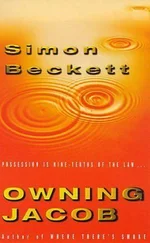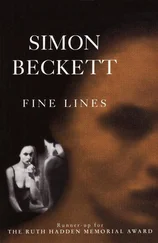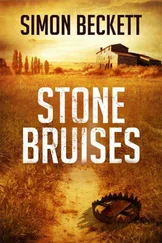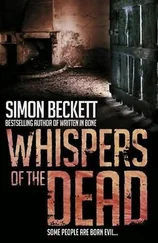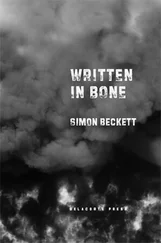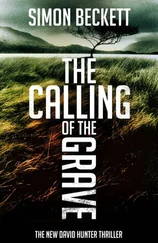Simon Beckett - The Chemistry of Death
Здесь есть возможность читать онлайн «Simon Beckett - The Chemistry of Death» весь текст электронной книги совершенно бесплатно (целиком полную версию без сокращений). В некоторых случаях можно слушать аудио, скачать через торрент в формате fb2 и присутствует краткое содержание. Жанр: Триллер, на английском языке. Описание произведения, (предисловие) а так же отзывы посетителей доступны на портале библиотеки ЛибКат.
- Название:The Chemistry of Death
- Автор:
- Жанр:
- Год:неизвестен
- ISBN:нет данных
- Рейтинг книги:5 / 5. Голосов: 1
-
Избранное:Добавить в избранное
- Отзывы:
-
Ваша оценка:
- 100
- 1
- 2
- 3
- 4
- 5
The Chemistry of Death: краткое содержание, описание и аннотация
Предлагаем к чтению аннотацию, описание, краткое содержание или предисловие (зависит от того, что написал сам автор книги «The Chemistry of Death»). Если вы не нашли необходимую информацию о книге — напишите в комментариях, мы постараемся отыскать её.
The Chemistry of Death — читать онлайн бесплатно полную книгу (весь текст) целиком
Ниже представлен текст книги, разбитый по страницам. Система сохранения места последней прочитанной страницы, позволяет с удобством читать онлайн бесплатно книгу «The Chemistry of Death», без необходимости каждый раз заново искать на чём Вы остановились. Поставьте закладку, и сможете в любой момент перейти на страницу, на которой закончили чтение.
Интервал:
Закладка:
'Taking a chance, aren't you?'
'What's he going to do? Report me?' He snorted derisively. 'You going to the Lamb later?'
'Maybe.'
'Might see you there, then.'
He drove off, the Land Rover's powerful engine leaving a haze of exhaust dissipating in the air behind it. As I set off for my house I thought about what he'd said. There was always a thriving black market for endangered species, and birds in particular. But given the role they'd played in Sally Palmer's mutilation and Lyn Metcalf's abduction it was something the police should know about. The problem was that aspect of the crimes hadn't been made public, so it wasn't something I could suggest to Ben. Which meant it was down to me to tell Mackenzie. I wasn't happy with the idea of going behind Ben's back, especially when it would probably turn out to be nothing. But I couldn't take that chance. Experience had shown me that sometimes even the smallest details could be important.
I didn't know it then, but that was about to be proved in the way I least expected.
15
That night there was another victim. Not at the hands of the man responsible for Sally Palmer and Lyn Metcalf. At least, not directly. No, this was a casualty of the suspicion and hostility that had started to grip the village.
James Nolan lived in a tiny cottage in a cul-de-sac behind the garage. One of my patients, he worked in a shop in a neighbouring village, a quiet man whose reserve hid both a gentle nature and a deep unhappiness. He was in his fifties, single and four stone overweight. He was also homosexual. The latter was something of which he was deeply ashamed. In a backwater like Manham, where such traits were regarded as unnatural, there had been little scope for sexual adventure. Consequently, as a young man he'd found such satisfaction as he could in the public parks and lavatories of nearby towns. On one occasion the man he'd approached had been an undercover police officer. The shame of the encounter lasted far longer than the suspended sentence he received. Inevitably, word of it leaked back into the village. Already marked for ridicule, now he was seen as something far more sinister. While the exact nature of his transgression was never discussed, and probably not even known, the rumour of it was enough to brand him. In the way that small communities have of ascribing roles to its members, he became the village untouchable, the pervert whom children were warned not to go near. And Nolan lived up to his image by retreating further into his isolation. He moved through the village like a ghost, speaking to few people, asking only not to be noticed. For the most part Manham was happy to comply, not so much tolerating as ignoring him.
Until now.
In a way, it was almost a relief to him when it happened. Ever since Sally Palmer's body had been found, he'd lived in fear, knowing that rationality didn't play any part in selecting scapegoats. At night when he returned from work he would hurry into his cottage and shutter himself inside, hoping that invisibility would continue to protect him. That Saturday night, though, it failed.
It was after eleven when the banging started on his door. He had turned off the TV, was preparing to go to bed. His curtains were closed, and for a while he sat in his chair, praying that whoever it was would go away. But they didn't. There were several of them, drunk and laughing at first as they mockingly called his name. Then the shouts grew angrier, the blows to the door more violent. It danced and shook under the assault, and Nolan looked at the telephone, almost giving in and calling the police. But a lifetime of not drawing attention to himself prevented it. Instead, when the callers changed tactics, threatening to break the door down unless he opened it, he did what he'd always done.
He did as he was told.
He'd kept the chain on, trusting to the steel links to protect him. Like everything else, they failed. The door and frame splintered under the renewed assault, knocking Nolan back into the hall as the men surged into his home.
Later, he claimed he hadn't recognized any of them, saying he didn't get a look at their faces. Whether he did or not, I find it hard to believe he didn't know who his attackers were. At the very least they must have been people he'd seen before, perhaps even young men whose parents or grandparents he had grown up with. They beat and kicked him, and then set about wrecking the house. When they'd smashed everything they could, they set about him again, this time not stopping until he was unconscious. It's possible that some semblance of reason made them stop before they killed him. Then again, his injuries were such they could easily have left him for dead.
It was some time after they had gone when my phone rang. I fumbled for it, still half-asleep, and failed to recognize the whispered voice that told me someone had been hurt. While I was still trying to rouse myself the caller told me which house to go to and then rang off. I stared dumbly at the receiver for a moment or two before I collected myself enough to phone for an ambulance. There was always a chance it was a false alarm, but this hadn't sounded like a prank. And it would take an ambulance long enough to get out here as it was.
On the way to Nolan's I stopped off at the police trailer in the village square. It was manned twenty-four hours a day, and I didn't relish the thought of going to the house by myself. It was a mistake. My call to emergency hadn't been passed on to them, and I wasted valuable time on explanations. By the time one of them agreed to come with me I wished I'd gone alone.
The cul-de-sac where Nolan lived was in darkness. It was easy to see which house was his, because the front door was wide open. I looked at the neighbouring houses as we approached. There was no sign of life, but I had the feeling that we were being watched all the same.
We found Nolan in the wreckage of his home where his attackers had left him. There was little I could do but put him in the recovery position, and then wait for the ambulance. He drifted in and out of consciousness, so I kept talking to him until the paramedics arrived. At one point when he seemed quite lucid, I asked him what had happened. But he only shut his eyes again, blocking out the question.
As he was carried out on a stretcher to the ambulance, one of the police officers who'd arrived with it asked why the caller had phoned me rather than the emergency services. I said I didn't know, but that wasn't really true. I looked at the flashing blue lights reflecting from the windows of the surrounding houses. Despite the disturbance, no-one was visible in them, and no-one had come out to see what was happening. But I knew people were looking. Just as they had looked on, or looked the other way, as first Nolan's door, and then the man himself, was assaulted. Someone's conscience might have been pricked, but not enough to try to stop the attack, or to involve outsiders. This was village business. Calling me, an almost-outsider myself, had been a compromise. There would be no witnesses to this, I was certain, just as no-one would ever admit to making the anonymous call. Even that, it emerged, had been made from the village's only public phone box, making the caller impossible to trace. As the ambulance drove away I looked at the blank windows and closed doors and felt like shouting at them. But what I would have shouted, or what good that would have done, I didn't know.
Instead, I went home and tried to sleep for what was left of the night.
Next morning I woke feeling grainy and ill at ease. I fetched a newspaper, then took it outside with a black coffee. The big weekend story was a train crash, compared to which the discovery of a second body in Manham merited only a few paragraphs on the inside pages. The fact it was unconnected with the more recent murder meant it was worth mentioning only as a curio, for its coincidence value.
Читать дальшеИнтервал:
Закладка:
Похожие книги на «The Chemistry of Death»
Представляем Вашему вниманию похожие книги на «The Chemistry of Death» списком для выбора. Мы отобрали схожую по названию и смыслу литературу в надежде предоставить читателям больше вариантов отыскать новые, интересные, ещё непрочитанные произведения.
Обсуждение, отзывы о книге «The Chemistry of Death» и просто собственные мнения читателей. Оставьте ваши комментарии, напишите, что Вы думаете о произведении, его смысле или главных героях. Укажите что конкретно понравилось, а что нет, и почему Вы так считаете.
